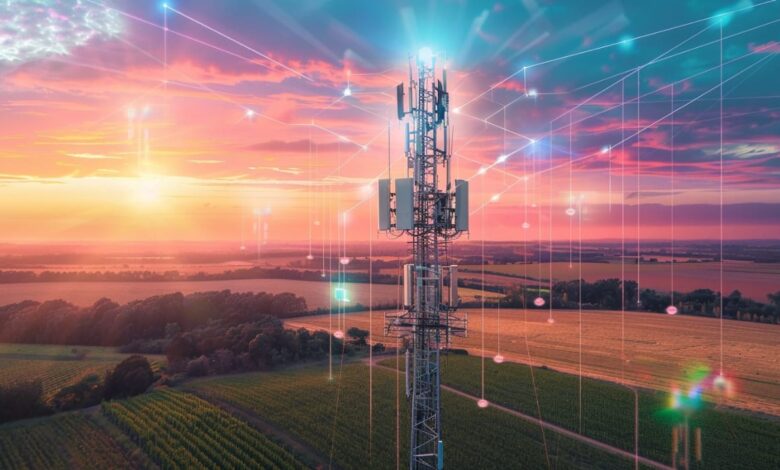How 5G Technology is Revolutionizing Communication

The arrival of 5G technology represents a significant advancement in communication. As the fifth generation of mobile networks, 5G is poised to change how we connect and interact with our surroundings. With its remarkable speed, minimal delay, and ability to connect many devices simultaneously, 5G will revolutionize mobile communication and various industries, including healthcare, transportation, and entertainment. Additionally, it could enhance the use of cryptocurrencies like Shiba Inu coin, making digital transactions faster and more efficient. This article looks at how 5G technology transforms communication and its potential to influence our future.
Understanding 5G Technology
5G technology is a significant upgrade from 4G LTE. While 4G offers speeds up to 1 Gbps, 5G can reach up to 20 Gbps, making it much faster. This means better streaming of high-definition videos, quicker downloads, and improved online gaming.
Another key feature of 5G is its low latency or the delay in sending data. With 5G, this delay can be as low as one millisecond, compared to 30-50 milliseconds with 4G. This fast response time is crucial for real-time communication, like self-driving cars, remote surgeries, and interactive gaming.
Moreover, 5G networks can connect up to 1 million devices per square kilometer, supporting the Internet of Things (IoT). This allows many devices, from smart home gadgets to industrial sensors, to connect and communicate effectively without overloading the network.
Enhanced Mobile Communication
The most immediate effect of 5G is on mobile communication. With its faster speeds and lower latency, users enjoy quicker and more reliable connections. Video calls are more explicit, streaming services have less buffering, and social media loads almost instantly. This improvement is significant as more people depend on mobile devices for communication, work, and entertainment.
Additionally, 5G technology enables innovative applications like augmented reality (AR) and virtual reality (VR). For instance, AR can overlay digital information onto the natural world in real-time, improving communication in fields like education, marketing, and remote teamwork. Meanwhile, VR provides immersive experiences that can transform remote meetings, allowing participants to interact in a shared virtual space.
5G Technology and Cryptocurrency
Combining 5G technology and cryptocurrency offers a significant opportunity to improve digital transactions and blockchain applications. With 5G’s fast data transfer and low latency, cryptocurrency transactions can be completed more quickly and efficiently. This is especially useful for decentralized finance (DeFi) platforms, which depend on timely trading data and liquidity management.
Additionally, 5G’s enhanced connectivity promotes the broader use of cryptocurrency in daily transactions. Businesses can easily integrate crypto payment systems, enabling instant payments and lowering transaction costs. For instance, retailers can accept real-time cryptocurrency payments, offering customers a fast and seamless checkout experience.
Furthermore, 5G can enhance the development of more advanced blockchain applications. Its capability to process large amounts of data swiftly allows smart contracts to function more effectively, enabling complex real-time agreements that were previously difficult to achieve. This collaboration between 5G and cryptocurrency could lead to innovative solutions like supply chain management and digital identity verification.
As 5G technology continues to flourish, it will likely drive further innovation in the cryptocurrency sector, creating a dynamic landscape that improves communication and financial transactions. The potential for 5G to transform our interaction with digital currencies is significant, making it a vital element in the future of finance and technology.
Transforming Industries
5G technology is not only improving personal communication; it also has significant effects on various industries. 5G supports telemedicine in healthcare, allowing doctors to conduct remote consultations and even perform surgeries using real-time robotic systems. This enhances access to healthcare and improves patient outcomes by enabling specialists to collaborate on complex cases from anywhere in the world.
The transportation industry can benefit significantly from 5G. Its quick response time and reliability help create smart transportation systems. For instance, connected vehicles can talk to traffic signals to find the best routes, reduce traffic jams, and improve safety. Additionally, sharing data in real-time can enhance logistics and supply chain management, making operations more efficient.
In the entertainment sector, 5G transforms content delivery and enjoyment. Its high-speed capabilities enable seamless streaming of 4K and even 8K videos. Live events, such as sports and concerts, can be broadcast in real-time with improved visuals and interactive features, offering viewers a more engaging experience.
Challenges and Considerations
While 5G technology offers many benefits, its rollout comes with challenges. One major issue is the infrastructure needed to support 5G networks. Unlike earlier generations, 5G requires a dense network of small cell towers, which demands significant investment in building this infrastructure. Urban areas may see faster implementations, while rural regions could fall behind, potentially increasing the digital divide.
There are also worries about safety and privacy because more things are connected to the internet. With more things online, there are more chances for bad guys to attack. We need good security to keep our information safe and keep people trusting us.
Conclusion
5G technology is set to transform communication by improving mobile connectivity and changing various industries. Its incredible speed, low latency, and ability to connect many devices create exciting opportunities for innovation and better user experiences. As 5G networks are deployed worldwide, they will change how we communicate, interact, and do business.
Though there are still challenges related to infrastructure and security, the potential benefits of 5G are substantial. By adopting this groundbreaking technology, we can anticipate a future where communication is faster, more reliable, and seamlessly integrated into our daily lives, opening the door to new advancements and possibilities. This journey is just beginning, and the future of communication looks promising with 5G.
Also Read: Discovering The Appeal of Diamond Green




